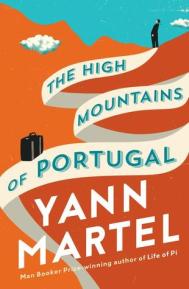 Yann Martel’s newest novel unfolds like a flower: subtle, delicate, and intricate.
Yann Martel’s newest novel unfolds like a flower: subtle, delicate, and intricate.
I’ve been looking forward to reading The High Mountains of Portugal for a long, long time. It’s one of those books I greeted with a sort of wary anticipation – after all, what could possibly live up to Life of Pi?
But I am so, so, so happy to say that this novel is so, so, so good.
The High Mountains of Portugal takes a form in three parts, each connected to the next by the fingertips:
A historian walks backwards as he grieves for his dead lover and child. When he uses his annual vacation to track down a mysterious religious relic in the mountains of Portugal, he must fight against elusive historical records, enraged and confused locals, and a monstrous, top-of-the-line automobile.
A pathologist answers the door at midnight and finds himself pulling a series of objects from a corpse – a flute, a selection of coins, a square of red cloth – in the most surreal autopsies he’s ever performed. The dead man’s widow watches the procedure and relates their life stories, searching for the answer to how her husband lived.
A Canadian senator adopts an ape and moves to a remote Portuguese village, where they live in a stone house without electricity or clocks. He teaches and protects the chimp with fierce loyalty, only to find himself taught and protected in turn – which is perhaps both the truest and most cliché way to put it.
The tales stand steadily on their own; each is heartbreaking, surprising, and tender in its own way. Martel’s mastery shines in the way these sections fit together gently, yet firmly – tracing the path of grief, family, and sacrifice through centuries and across countries. What does it mean to mourn, to remember, or to understand? Is enduring love and faith more likely to result in strength, or despair? Can absence – of a child, a wife, an extinct species of rhinoceros – ever truly be filled?
As ever, Martel’s narrative is layered with metaphor and leaves the interpretation in the reader’s hands. It can be taken at face value, or unravelled like a skein of wool. What is the true significance of a man who walks backwards, or of the title-bearing “mountains” themselves – which are really a series of rolling hills spotted with rough, mysterious boulders?
After Martel lovingly leads the reader through a detailed section devoted to Agatha Christie’s novels, it’s almost irresistible to read this novel as a sort of murder mystery. After all, each of these characters has been heart-broken in some way; Martel seems to focus almost obsessively on things that have been lost, stolen, overlooked, or forgotten. Who has taken what, and from whom? We’ve been given all the clues; it is up to the reader to figure out how they fit together.
And perhaps this is the greatest strength of The High Mountains of Portugal: the pieces fit together in so many different, vibrant combinations that the book reflects the reader as much as the author. Martel writes with a voice that is nostalgic, honest, and so very Canadian – stalwart and lyrical to the very bones.

This review originally appeared in The Ottawa Review of Books.
I’m glad to hear you liked this so much. Most of the reviews I’ve seen haven’t been so positive. It’s good to see!
LikeLike
I was really nervous – because I’ve seen a plenty of critical reviews too. I think it comes down to personal preference – I really enjoyed the book’s style and structure, but I can see where others might not connect with it as strongly.
LikeLiked by 1 person
Thank you for the lovely, insightful review. I wasn’t sure if I’d be picking this up, I’d read a number of not-so-enthusiastic reviews, but you clinched the deal and this will now be read by the end of the year. 🙂
LikeLiked by 1 person
I’m so glad! I also saw a fair few negative reviews but refused to be deterred.
LikeLiked by 1 person
So what’s better, Life of Pi or The High Mountains of Portugal? Or you can’t really compare them in quality?
LikeLike
That’s a tough question. I loved them both, but I feel that High Mountains is more complex and has more to explore. It feels almost sacrilegious to say High Mountains is the better novel between the two – but I think it’s true. But hesitantly! Hesitantly true!
LikeLiked by 1 person